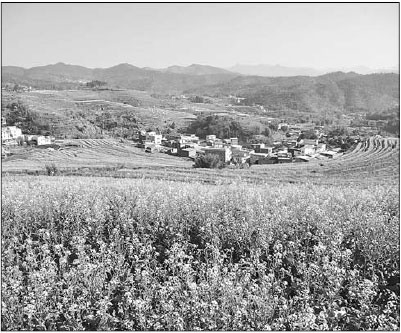Village takes pride in historic links to Lee
Authorities in Dabu county, Guangdong province, have been working on the construction of "Lee Kuan Yew's Homeplace" to commemorate Singapore's first prime minister.
Lee Kuan Yew died aged 91 on March 23 last year and his ancestral home is in the tiny village of Tangxi in southern Guangdong province's Dabu county, where local people are proud of their links with the founding father of modern Singapore.
It was Lee Kuan Yew's Hakka great-grandfather, Li Muwen, who built the ancestral home in 1884 with money he had earned working in Singapore.
Lee, however, never set foot in either the 180 sq m house or Tangxi village.
Tangxi Party Secretary He Jiaxing, 58, told The Straits Times that affection for Lee Kuan Yew runs deep in the village despite the fact that the late leader never paid a visit.
"We are still immensely proud that a world leader has come from our village and have a lot of respect for him," said He.
Since 2008, the local authorities have turned the eight-room building into an exhibition of Lee Kuan Yew's life and accomplishments. There are pictures and write-ups of his time as a student in Britain, his family and political life, diplomatic accomplishments and a detailed family genealogy. The house was declared a city-level cultural protection site in 2014. Local authorities said they would spend more than 30 million yuan on the first phase of development.
In addition to multiple signs throughout the village harking back to Lee's ancestry, a man-made lake surrounded by Chinese-style pavilions has also been built, together with a two-storey memorial hall that opened last October.
Consisting of four multimedia exhibition halls, the memorial hall includes information on the key role Lee played in establishing ties between China and Singapore and his contribution to the city state's nation-building efforts.
There are also life-sized rubber sculptures of Lee and his wife, Kwa Geok Choo, who died in 2010.
In 2015, when news of Lee's death reached Tangxi, more than 1,000 mourners visited the house, also known as Zhonghandi, to pay their last respects with the lighting of incense and offerings of candy and rice wine.
They also held local funeral rites, such as the burning of paper money at the entrance of Zhonghandi, in the belief that this would allow Lee's soul to return home.
Earlier this year, on the first anniversary of Lee's death, Tangxi's villagers were eager to take part in memorial activities to remember a man who, they said, has put their village on the world map.
"It's our simple way of remembering a great man," Shenzhen-based businessman Li Gang, who was originally from Tangxi, told the Straits Times.
"Everyone in Tangxi is proud of him. We follow news of Singapore and know how well it's governed, especially how well Mr Lee ran the country and ensured its clean governance," said retiree Li Wenying, 77. More than 300,000 ethnic Hakka people live in Singapore and about 70 percent were originally from Dabu, according to the county's overseas Chinese affairs bureau, said a Xinhua news agency report.
Esther Teo contributed to this story.
zhuanti@chinadailyhk.com
|
Scenery in Dabu county, Guangdong province, where Lee Kuan Yew’s ancestral home is located. Zhong Xiaofa / Xinhua |
(China Daily 05/10/2016 page5)













